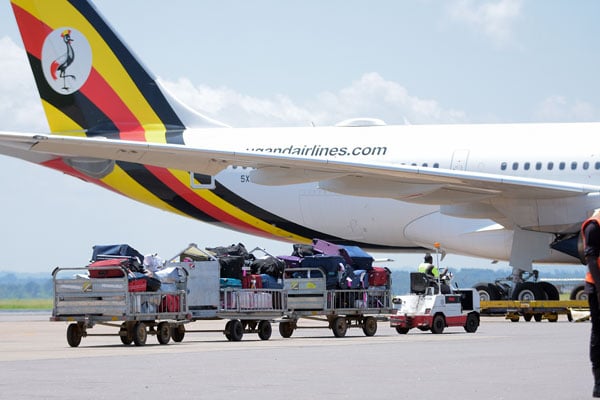Prime
Plan to inject Shs120b into Uganda Airlines sparks rage

The bombardier planes after their arrival at Entebbe International Airport on April 23, 2019. PHOTO/ FILE
What you need to know:
- MPs question the rationale behind such a substantial allocation for an entity with allegedly poor profits.
Legislators on the House Committee on Budget are enraged by government plan to inject Shs120.9 billion into the national carrier Uganda National Airlines in the Financial Year (FY) 2024/2025 that will commence in July this year.
This was after the budget committee received a report submitted by the committee on physical infrastructure on the budget framework paper for the FY 2024/2025 this week, revealing that more funds will be pumped into Uganda Airlines.
“Government intends on increasing it’s funding for the Uganda National Airlines by Shs34.9 billion to Shs120.9 billion in the Financial Year 2024/2025,” the report presented by the vice chairperson of the physical infrastructure committee, Mr Tony Awany, reads in part.
The report adds that the funds would be used to cover staff wages and other related expenses.
“These resources will be used to cater for; payments of Civil Aviation Authority, wages, obtaining ISOA and ISAGO certifications, staff training, procuring aviation fuel, Insurance cover for aircraft, in-flight catering, ground handling charges and payment of Airport charges in other destinations,” the report further states in part.
Many legislators are, however, concerned that government planned to splash Shs120.9 billion into an entity whose profits are allegedly poor.
The Sheema Municipality legislator, Mr Dickson Kateshumbwa, said: “We need to understand the government investment in the airline; how many shares does the government have? How much do they intend to invest in the short term, midterm, and long term, and which funding vehicle.”
The Maruzi MP, Mr Maxwell Akora, inquired about the anticipated break-even point for Uganda Airlines and the current fundraising amount. He emphasised the need for clarity as they would serve as basis in making an informed decision regarding the approval of the funds.
Legislators, including the Bugabula North MP, Mr John Teira, expressed their concern that the government should explore avenues to make Uganda Airlines self-sustainable.
“My small understanding is that a business which is generating revenue should be able to meet its operational expenses. And then we should come to the budget committee to seek for money for capital expenditure. Now in Uganda Airlines the story is different. There is a continuity of meeting both operational expenses and at the same time there is the desire to meet additional capital expenses, will that company ever grow if we continue,” Mr Teira said.
Other MPs questioned the government’s decision to allocate billions to a single entity when there are other sectors facing significant challenges.
Mr Patrick Isiagi, the chairperson of the budget committee, highlighted that while some road construction projects are in plans, many are carried out by foreign entities, leading to increased costs due to imported labour.
“You will find Chinese here doing the roads, that means that we totally have no capacity in road construction,” Mr Isiagi said.
Despite his unsuccessful attempt to persuade legislators to allocate Shs120.9 billion for Uganda Airlines operations in the upcoming Financial Year, Physical Infrastructure vice chairperson, Mr Awany announced that the committee would require formal responses from Uganda Airlines officials regarding its financial performance.
While no definitive stance has been reached, the budget committee is set to convene in a closed-door session for further deliberations. The committee’s final decision will be included in a report to be presented and discussed by the entire House, likely in the coming week.
Tough history
In 2022, legislators led by Mr Joel Ssenyonyi grilled Uganda Airlines Chief Executive Officer, Ms Jenifer Bamuturaki, on how the Uganda Airlines suffered a Shs498 billion loss in its initial years of operation.
At the heart of the probe, also queries were raised about staff salaries, and procurement processes undertaken without complying with the provision of the law.




